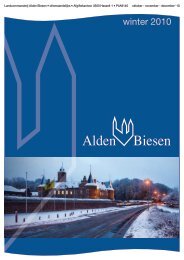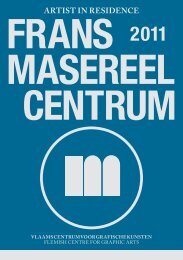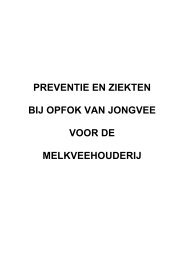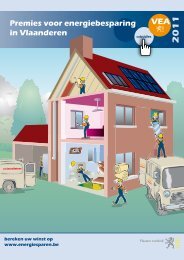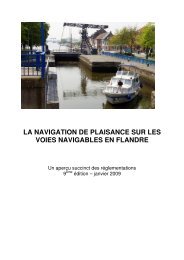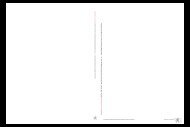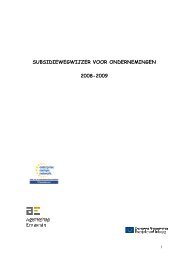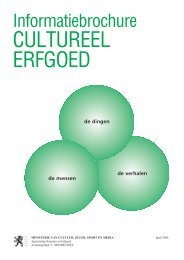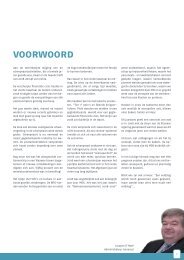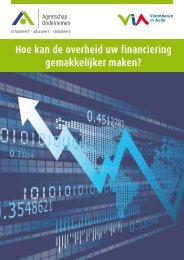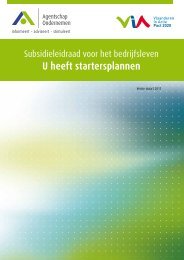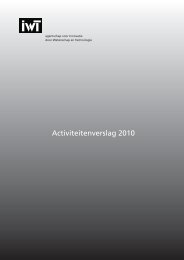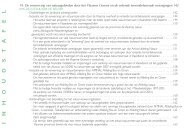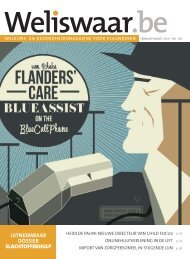Acknowledgements Book of abstracts - Publicaties - Vlaanderen.be
Acknowledgements Book of abstracts - Publicaties - Vlaanderen.be
Acknowledgements Book of abstracts - Publicaties - Vlaanderen.be
Create successful ePaper yourself
Turn your PDF publications into a flip-book with our unique Google optimized e-Paper software.
Pete Goddard presents Workshop paper 6<br />
In workshop 3: Do extensive production systems provide high animal welfare?<br />
Friday, 12 Septem<strong>be</strong>r 2008 from 14h00-15h45 in the Het Pand chaired by Pete Goddard<br />
181<br />
Workshop paper 6<br />
DO EXTENSIVE PRODUCTION SYSTEMS PROVIDE HIGH WELFARE<br />
FOR THE ANIMALS IN THOSE SYSTEMS? SETTING THE SCENE<br />
P. Goddard 1 , C. Dwyer 2<br />
1 Macaulay Institute, Craigiebuckler, A<strong>be</strong>rdeen, UK<br />
2 Scottish Agricultural College, King’s Buildings, West Mains Road, Edinburgh, UK<br />
The freedom <strong>of</strong> extensively-managed animals to express more <strong>of</strong> their <strong>be</strong>havioural repertoire than<br />
animals within intensive systems has generated the assumption that animals in extensive systems<br />
enjoy high welfare status. Yet extensively-managed animals may experience a num<strong>be</strong>r <strong>of</strong><br />
challenges: prolonged periods when food and water are scarce; climatic extremes; untreated disease<br />
or injury; and possibly high levels <strong>of</strong> fear and stress, during handling. In providing good welfare,<br />
the farmer in extensive systems faces additional challenges: e.g. access to land to inspect animals.<br />
Decisions about whether to gather all the animals to treat a small num<strong>be</strong>r at welfare risk is a<br />
significant farming decision with high costs to the farmer, and welfare risk to other animals that are<br />
gathered and handled. Stock inspection can differ in extensive systems; welfare standards are <strong>of</strong>ten<br />
vague in terms <strong>of</strong> requirements and recognised good practice. Trade-<strong>of</strong>fs must <strong>be</strong> made by the<br />
farmer, depending on his personal, animal welfare and economic goals, and these may differ from<br />
the genuine welfare needs <strong>of</strong> the animal.<br />
This workshop will challenge different stakeholder perspectives on the welfare <strong>of</strong> animals in<br />
extensive systems since it is clear that all players, but primarily the consumer, the farmer and the<br />
welfare assessor or lobbyist, might hold differing views on the welfare <strong>of</strong> animals kept under<br />
extensive conditions.<br />
Consumers may <strong>be</strong> reluctant to pay more for welfare <strong>be</strong>nefits in a system that they already <strong>be</strong>lieve<br />
provides good welfare. This could act as a constraint that might prevent farmers from achieving<br />
welfare objectives, as the expressed consumer <strong>be</strong>haviour would not reward these efforts.<br />
Reaching a consensus view on the current welfare state <strong>of</strong> animals in extensive systems will help to<br />
<strong>be</strong>nchmark and assess whether and by what means animal welfare in these systems can <strong>be</strong><br />
improved.<br />
Contact information: Pete Goddard or email p.goddard@macaulay.ac.uk<br />
Complete address: Macaulay Institute, Craigiebuckler, A<strong>be</strong>rdeen, AB15 8QH, UK<br />
Species: General



